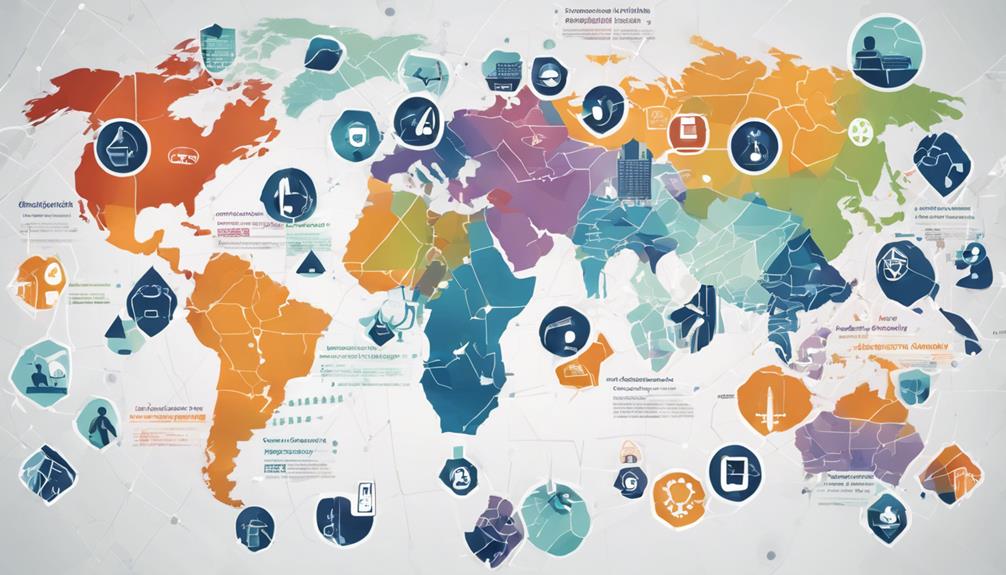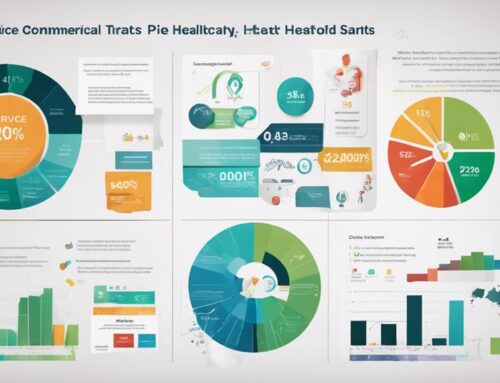In 2023, the security industry’s employment trends highlight a pressing demand for skilled professionals, especially in cybersecurity. The Asia-Pacific region alone faces a shortage of 2.6 million experts. North America and Europe offer competitive salaries, making them attractive for talent. Companies are investing heavily in staff compensation to attract highly skilled professionals. The industry values expertise in AI, machine learning, and cloud security. Soft skills like communication and problem-solving are increasingly important. Technology advancements, such as AI and cloud migration, are reshaping security measures. For deeper insights into these trends, especially regarding salary and skills, continue exploring.
Key Takeaways
- High demand for cyber security professionals in the Asia-Pacific and Latin America regions due to significant skill shortages.
- North America and Europe lead in offering high salaries, attracting top cyber security talents.
- Technical skills in AI, machine learning, and cloud security are increasingly essential for securing modern systems.
- Companies are investing heavily in staff compensation, with 38% of security budgets allocated to workforce expenses.
- Continuous learning and soft skills like communication and problem-solving are crucial for adapting to rapidly evolving security demands.
Demand for Locksmiths
Have you ever wondered why locksmiths are always in demand? The answer is simple: they provide essential services that guarantee control over your security. Whether you’re moving into a new home, upgrading your security system, or managing a commercial property, locksmiths play a vital role. They specialize in key cutting, lock installation, and emergency lockout assistance, making them indispensable for maintaining the safety and security of your assets.
When you consider the security industry, skilled locksmiths are at the forefront. They undergo specialized training to keep up with the latest advancements in security technology. From sophisticated access control systems to traditional lock and key mechanisms, locksmiths have the expertise you need to secure your home, business, or vehicle effectively.
In times of emergency, such as being locked out of your property, a locksmith’s prompt response can save you time and stress. Their role extends beyond just opening doors; they install and maintain security systems that protect your most valuable assets. By investing in a professional locksmith, you’re ensuring that your security measures are robust and reliable, giving you the control and peace of mind you deserve.
Regional Employment Variations

While locksmiths play an essential role in local security, the global cyber security landscape reveals significant regional employment variations. In the Asia-Pacific region, you’ll notice robust growth in the cyber security workforce. However, this area also faces the highest shortage, with approximately 2.6 million professionals needed to meet demand. This gap presents both a challenge and an opportunity for you if you’re looking to enter or advance in this field.
North America and Europe stand out by offering some of the highest salaries for cyber security professionals, attracting top talent. Despite their financial allure, these regions still face challenges in meeting the growing demand for skilled workers. In contrast, Latin America faces a shortage of around 350,000 cyber security professionals, signaling a slower growth rate compared to other regions.
The Middle East and Africa also exhibit strong growth in cyber security employment, driven by increasing digitalization and security needs. For businesses fully based in the cloud, 47% of security budgets are allocated to staff and compensation, highlighting the importance of human resources in ensuring robust security measures. So, understanding these regional trends can help you position yourself effectively in the evolving cyber security landscape.
Salary Trends
When considering salary trends, you’ll notice competitive wage increases across the cyber security industry, especially in North America and Europe. Regional pay variations are significant, with these areas offering some of the highest salaries. This reflects the robust investment in cyber security and the ongoing demand for skilled professionals.
Competitive Wage Increases
Reflecting the industry’s commitment to attracting top talent, businesses in 2023 have allocated a significant 38% of their security budget to staff and compensation. This allocation underscores a clear trend: competitive wage increases are vital for acquiring and retaining skilled professionals in the cyber security sector.
The cyber security workforce grew by 8.7% from 2022 to 2023, and this expansion directly influences salary trends. As the demand for cyber security experts rises, so do their salaries. Companies understand that offering competitive wages is essential to fill critical roles and maintain a secure operational environment. You can see this strategic investment particularly in businesses fully based in the cloud, where 47% of their security budgets go towards staff, highlighting the premium placed on talent in this domain.
Moreover, the cyber skills gap plays a significant role in driving up salaries. With more positions than qualified candidates, companies must offer enticing compensation packages to stand out in the competitive job market. By focusing on competitive wage increases, you’re ensuring your organization attracts top-tier talent and retains them, safeguarding your digital assets and maintaining your operational integrity.
Regional Pay Variations
Examining regional pay variations reveals that North America and Europe offer some of the highest salaries for cyber security professionals. If you’re looking to maximize your earnings, these regions are your best bet. North America leads with the highest median salaries, reflecting the significant investment businesses make in their security staff. Approximately 38% of security budgets in this region go towards staff and compensation, ensuring competitive pay.
Europe follows closely, also offering lucrative salaries driven by a robust demand for cyber security experts. However, if you’re considering opportunities in Latin America, be aware that while salaries are rising, the region still faces a shortage of around 350,000 cyber professionals. This shortage could mean more opportunities, but it may not yet translate to salaries as high as those in North America or Europe.
In the Asia-Pacific region, the cyber security workforce is growing rapidly. Despite this, there’s still a need for about 2.6 million additional security professionals. While there are plenty of job opportunities, the pay might not be as high as in Western regions. However, the strong growth signals a promising future for salary increases in the area.
Skill Requirements

When looking at skill requirements in the security industry, you’ll notice a strong demand for technical proficiency, especially with certifications like CompTIA Security+ and CISSP. Employers also value soft skills such as communication and problem-solving. To stay competitive, you must commit to continuous learning and staying updated on the latest industry trends.
Technical Proficiency Demand
In today’s security industry, employers are increasingly seeking professionals with technical proficiency in AI, machine learning, and cloud security to address evolving threats. If you’re looking to stand out, expertise in these areas is essential. AI and machine learning are at the forefront of combating sophisticated cyber threats, and professionals who can harness these technologies are in high demand. By mastering these skills, you’ll position yourself as an indispensable asset to any security team.
Cloud security is another critical area. As organizations migrate to cloud-based systems, they’re prioritizing experts who can secure these environments effectively. Your ability to navigate and protect cloud infrastructures will make you a sought-after candidate. Additionally, proficiency in data analytics, automation, and network security will round out your skill set, enabling you to excel in a dynamic and ever-evolving industry.
Taking control of your career means investing time in developing these technical proficiencies. The security landscape is changing rapidly, and staying ahead of the curve will ensure you’re not just keeping up, but leading the way. Equip yourself with these advanced skills, and you’ll be ready to tackle the industry’s most pressing challenges.
Soft Skills Importance
Effective communication, problem-solving, and teamwork are essential soft skills that can greatly enhance your performance in the security industry. Employers don’t just look for technical prowess; they prioritize these soft skills to make certain you can handle the job effectively. Strong communication helps you convey critical information swiftly and clearly, a necessity in high-stakes situations. Problem-solving enables you to think on your feet and find quick, effective solutions when unexpected issues arise.
Teamwork isn’t just about working well with colleagues; it’s also about coordinating with various stakeholders, from clients to law enforcement. Good teamwork ensures everyone is on the same page, which is vital for maintaining a secure environment. Adaptability and empathy are equally important. Being adaptable means you can handle diverse situations with ease, while empathy allows you to interact positively with people under stress, thereby de-escalating potential conflicts.
In emergencies, these soft skills become even more critical. Being able to stay calm, communicate effectively, and work as a cohesive unit can make all the difference. If you want to excel in the security industry, honing these soft skills is non-negotiable. It’s not just about what you know, but how you apply it.
Continuous Learning Necessity
Staying ahead in the security industry demands a commitment to continuous learning and skill enhancement. With rapidly evolving skill requirements, you can’t afford to rest on your laurels. Employers are on the lookout for professionals who stay updated in cutting-edge areas like AI, cloud security, and advanced threat detection.
As the industry grapples with emerging technologies and evolving threats, continuous learning becomes your key to maintaining control and effectiveness. Keeping abreast of the latest trends in cybersecurity, physical security, and surveillance isn’t just beneficial; it’s essential. If you want to stay relevant, you must consistently expand your knowledge base and refine your skills.
Impact of Technology

As technology advances, the security industry embraces a shift towards cloud migration and agile systems. By moving to the cloud, you can eliminate cumbersome hardware, resulting in a more streamlined and efficient security architecture. This shift allows for quicker updates and less downtime, ensuring your security measures are always up-to-date.
Adopting agile security systems means you can respond faster to emerging threats. Without the constraints of heavy hardware, your security operations become more flexible and adaptable. Additionally, the integration of powerful cameras and cutting-edge technologies enhances your ability to monitor and protect assets effectively.
Environmental sensors add another layer of security by monitoring various conditions, such as temperature, humidity, and air quality. This proactive approach helps you detect potential threats before they escalate, giving you greater control over your environment.
Future Outlook

The future of the security industry is set to be revolutionized by the integration of advanced technologies like AI and quantum computing. As you navigate this evolving landscape, you’ll notice that AI impacts security operations through four distinct components: predictive analytics, threat detection, response automation, and continuous learning systems. These technologies offer you greater control and actionable intelligence, enhancing your ability to anticipate and mitigate risks effectively.
According to the Security Industry Association’s annual report, other pivotal trends include autonomous devices and post-quantum cryptography. These advancements promise to fortify your security measures against emerging threats. As global tensions rise, the need for robust and adaptive security solutions becomes even more vital. You’ll find that cloud migration and hardware-free architecture are gaining traction, offering you scalable and flexible security options without the need for extensive physical infrastructure.
Workforce development is another important aspect. As technology evolves, so must your team’s skills. Investing in training and certifications will empower your workforce to harness these cutting-edge tools effectively. By staying ahead of these trends, you’ll guarantee your organization remains secure and resilient in an increasingly complex world.
Frequently Asked Questions
What Are the Typical Working Hours for Security Industry Professionals?
You’ll find typical working hours for security professionals range from 8 to 12-hour shifts. Given the need for 24/7 coverage, rotating schedules and night shifts are common to guarantee continuous surveillance. During special events or emergencies, you might work extended shifts. Flexibility is key, as security needs can vary. You’ll need to adapt to different schedules to effectively manage security responsibilities around the clock.
How Does Job Satisfaction Compare Across Different Roles in the Security Sector?
Isn’t it interesting how job satisfaction varies within the same industry? As a security manager, you’re likely to feel more satisfied, with 75% of your peers sharing that sentiment. On the other hand, security guards report only 60% satisfaction. Key factors like advancement opportunities, training programs, and work environment play a huge role. Understanding these differences can help you tailor strategies to boost overall job satisfaction and control employee retention.
Are There Any Common Health Risks Associated With Security Industry Jobs?
Yes, there are common health risks in security industry jobs. You might face physical injuries from confrontations, accidents, or repetitive tasks. High-stress environments and long hours can lead to mental health issues like anxiety and depression. Exposure to hazardous materials and dangerous situations also poses serious risks. These health challenges can vary depending on your specific role, work environment, and the nature of your security operations.
What Are the Most Common Career Advancement Opportunities in the Security Field?
You’ve got several paths for career advancement in the security field. Specialize in cloud security, AI, or machine learning to future-proof your career. Get certifications like CompTIA Security+ or CISSP to boost your credentials. Master physical security technologies and access control systems for growth. Aim for leadership roles such as security manager, director, or chief security officer. Always keep learning and stay updated on the latest trends and technologies.
How Do Security Industry Certifications Impact Employability?
Security industry certifications can skyrocket your employability. Imagine being the go-to expert everyone wants on their team. Employers practically line up for candidates with CompTIA Security+ or CISSP. These certifications scream competence and expertise. They’re not just pieces of paper; they’re your golden tickets to better job prospects and career advancement. Get certified, and watch the doors of opportunity swing wide open for you.









